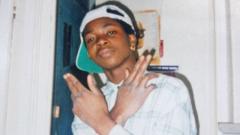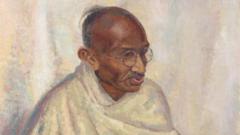Forced to relocate from London to Ghana without warning, Mark Wilberforce initially felt trapped but ultimately discovered resilience, respect, and a deep appreciation for his heritage, ultimately leading him to a brighter future.
A Journey from London Misery to Ghanaian Discovery: One Man's Redemption

A Journey from London Misery to Ghanaian Discovery: One Man's Redemption
Mark Wilberforce reflects on how being sent to school in Ghana at 16 transformed his life, providing education and discipline critical to his future.
When I was told by my mother at the age of 16 that we would be spending summer holidays in Ghana, I had absolutely no idea it was a one-way ticket. What seemed like a short getaway transformed into a life-altering experience. One month into what I thought was a temporary trip, my mother revealed a shocking truth: I would not return to London until I had earned enough GCSEs and reformed my ways.
Reflecting on my journey, I empathize with the young British-Ghanaian teenager who recently took his parents to court for similar circumstances. His parents expressed concerns about their son becoming "just another black teenager stabbed to death in London," a fear that resonates with my own upbringing. A mid-1990s youth in London, I had been expelled from two schools, surrounding myself with a troublesome crowd that ultimately led my mother to make the difficult decision.
While the teenager's court case ended unfavorably last week, my life took a turn for the better. Instead of boarding school, my mother entrusted me to her two brothers in Accra, who had an invested interest in guiding me. Initially, I resented the 5 AM wake-ups, chores, and the discipline that came from staying with my Uncle Fiifi, a former UN environmentalist, in Dansoman.
The new life was austere. Gone were the days of independence; I was back to a routine filled with responsibilities and included menial tasks like washing his pick-up truck. In one pivotal incident, my reckless behavior culminated in stealing my aunt’s car and crashing it into a soldier's Mercedes. This moment marked a turning point in my life, pushing me to rethink my actions, especially after a harrowing encounter with a military man who threatened me.
As challenging as my new life seemed at first, this "punishment" slowly taught me valuable lessons. Life in Ghana made me realize how much I had taken for granted in London—simple luxuries such as electricity and processed fast food. The traditional methods of cooking, like the arduous process of preparing the dough-like dish fufu, instilled in me a sense of patience I had never before known.
Instead of enrolling in elite schools in Ghana, my uncles wisely chose to offer me private tuition at Accra Academy, a secondary school my late father attended. English was the medium of instruction, but I soon picked up local languages, enriching my immersion. Initial struggles turned into breakthroughs as I faced a more rigorous educational system than I had experienced in London, leading me to work tirelessly and achieve five GCSEs after several years.
Ultimately, the discipline and respect learned during my time in Ghana reinforced my identity and instilled values that persist today. Football also played an essential part in my growth; it was my refuge. Playing in local parks on rough surfaces forged resilience and camaraderie among peers. Sundays often found me at the beach playing football, although church attendance was non-negotiable—a key aspect of Ghana’s deeply religious culture.
The first 18 months were tough. I grappled with feelings of isolation, longing for my old life, and even sought to flee by attempting to steal my passport. But my mother, wise and forward-thinking, had hidden it away, forcing me to adapt to my new environment. Slowly, my imprisonment morphed into a newfound love for my Ghanaian home.
As I look back years later, I see how my experience shaped my character. Today, I cherish Ghanaian food like "waakye" - rice and black-eyed peas - and find joy in the warmth of the people and the vibrant culture. My mother’s decision saved me from a potentially grim fate in London, redirecting my path toward education and self-discovery.
In my later years, I would return to England to pursue a degree in media production before joining BBC Radio 1Xtra, a stark contrast to the dire path I was on. Many of my former peers did not have the chance that I did; my time in Ghana gave me the tools I needed to succeed.
This journey wasn't just about academics; it was a comprehensive transformation that prepared me for life. I owe a great deal to my mother, my uncles, and to Ghana, a place I initially resisted but which ultimately cultivated my resilience, respect, and future prospects. While this experience may not resonate with everyone, for me, it was everything.






















